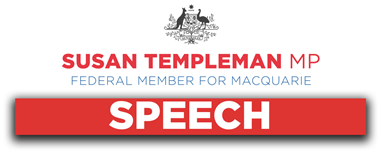
I think 'taking control of their own economic circumstances' is code for, 'Get a better job,' or, 'If you're feeling rental pressure, go and buy yourself a house.' What we just heard in the last 10 minutes was a speech that shows how out of touch those opposite are.
I want to remind people that the last few weeks are not the first time that we have stood here and talked about the cost of living. I went back to the start of this term in 2019. There are speeches in Hansard where I have raised the feedback I was getting from my constituents about the pressures they were feeling just to keep their head above water, to be able to earn enough to pay the bills and, if they were lucky, have a little bit left over. These are not new pressures. You cannot blame a terrible and tragic war that is happening for what people are feeling now. All we're seeing from this government is a quick sugar hit, a bit of a, 'Let's just toss something out for a quick fix.' There is not a single thing that they have put forward that gives anyone hope that things will get better in the medium to long term.
I want to point out that, when you talk cost of living, one of the things that gives you the biggest hit to cost of living is when a natural disaster strikes. Your economic future changes. This idea you control your own economic future—you tell that to people who lost their homes, whether it was to bushfires in 2013 or 2019 or whether it was to floods in 2021 or 2022. That's the stuff that really hurts. What I want to remind people about is what that mob across there did in October 2013 when 200 people lost their homes and hundreds more had damage to their property but didn't lose their homes. What they did was change the rules for the disaster payment, the whole $1,000—it was $1,000 nearly nine years ago and it's still $1,000 for an adult and $400 for a child. What they did, the day after my house and 200 other houses burnt down, was tighten that criteria. So, yes, I was entitled to it because my house had burnt down, but neighbours whose properties were partially damaged, who lost tracts of land, who lost all sorts of external possessions, who weren't able to get back to their homes for days, who had their power cut and who had everything in their fridges and freezers destroyed got nothing, because, on the day after those fires, those opposite thought they would change the rules and make it impossible for people who were devastated and suddenly found themselves with an extraordinary number of immediate expenses. That's the attitude that they've got. Those are the sorts of people they are. It says everything about how much they care about our communities.
I think what they forget, or what they just don't even realise, is how hard people are working to keep their heads above water. Remember: nearly a million Australians are working multiple jobs just to make ends meet. That shows up in the ABS data. That's not because they like working more, and it isn't because they want to; it's because they have no choice in order to pay the bills that they face. They're not the high-paying jobs. These are the low-paid frontline workers, and they need that extra money. Many of us in here have kids. We've seen what our kids, in their 20s and into their 30s, have had to do to try and subsist in an ever-increasingly expensive world. Whether it's petrol, their phones or the internet, these are things that are essential. These are not just nice things to have; these are essential things to help them live their lives and do their work. But there is nothing that this government can put forward other than some short-term little bandaids.
I also want to remind those opposite that another time you really feel it is when you're young and when you've got your own young children. That's when you really feel the cost-of-living pressures. That's why Labor's approach to making child care cheaper, whether it's before and after school or whether it's long day care, makes a difference to people's lives. It's something that those opposite only think you deserve if you have more than one child in care.
The other time you feel the pressure is when you or someone in your family is ill. Everyone in this chamber would have had people talk to them about out-of-pocket costs, whether it's hospital, psychiatry or psychology costs. Those are the things that hurt. That's why Labor's commitment to universal Medicare will make a difference.


